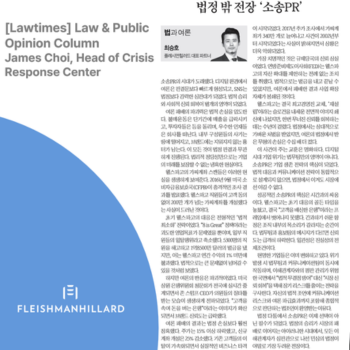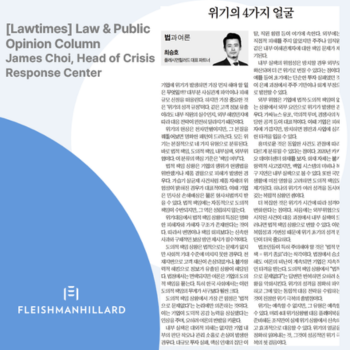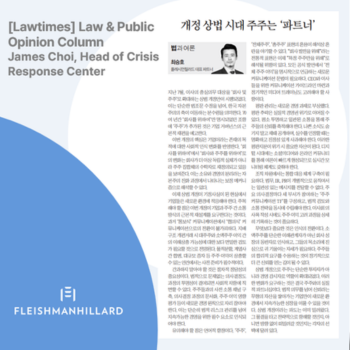2025 AGM: Building shareholder trust, protecting corporate reputation through stakeholder-centered communication
By Wang Yang

The 2025 annual general meeting (AGM) season is fast approaching and with the recent passage of amendments to the Commercial Act in the National Assembly, interest and debate surrounding the strengthening of shareholder rights have intensified. Consequently, movements for shareholders to directly participate in decision-making and actively voice their opinions on corporate policies and governance are expected to become more vigorous.
Amid these developments, activist funds are gaining attention. These funds propose board replacements, sales of specific business units, and mergers and acquisitions to quickly drive outcomes such as share price increases and dividend expansions. In this process, they employ various strategies including proxy contests, litigation and media campaigns. Domestic activist funds in particular are focusing on improving dividend policies, canceling treasury shares and reforming governance structures.
Activist campaigns are also expanding globally. According to the 2024 Review of Shareholder Activism published by Barclays on the Harvard Law School Forum on Corporate Governance, global activist campaigns averaged 236 annually from 2022 to 2024, reaching record levels. The Asia-Pacific region has also seen a steady spread of activist campaigns, with 66 campaigns primarily concentrated in Korea and Japan.
In response to these aggressive movements by activists, major institutional investors such as Korea’s National Pension Service and global firms like BlackRock and Vanguard are exercising their voting rights more actively. While these investors fundamentally prioritize corporate sustainability and growth potential from a long-term investment perspective, they are now more firmly monitoring boards and advocating more strongly for shareholder value. They are demonstrating increasingly careful and proactive attitudes in exercising their voting rights.
It is important to note that when activists and long-term institutional investors criticize the current management situation, board structure, or decision-making processes in the name of enhancing corporate and shareholder value, the ripple effects can spread throughout the capital market, generating various forms of noise. When such conflicts are amplified through the media, corporate reputation can be significantly damaged — causing anxiety among employees and customers alike. Consequently, companies must focus on managing stakeholder reputation and trust alongside responding to shareholders.
The key is to prepare a communication strategy that minimizes corporate reputation risk while reasonably responding to shareholders’ demands. First, in terms of shareholder response, companies need to proactively present long-term growth visions and shareholder return policies, specifically explaining and seeking an understanding of the values that each investor prioritizes. Whether dealing with activists or institutional investors, identifying their demands or concerns in advance and responding with proactive messaging can reduce unnecessary conflicts.
Additionally, companies should review proxy advisory firms’ voting guidelines and the National Pension Service’s stewardship guidelines from the early stages of preparing AGM agendas. Companies need to understand these continuously updated guidelines and maintain networks to actively share their policy changes even during non-AGM periods.
Recently, global proxy advisory firms like Institutional Shareholder Services and Glass Lewis have been emphasizing new elements such as whether boards possess risk management capabilities for artificial intelligence and cybersecurity, so it is important to prepare in advance and consistently reflect these considerations in communications with shareholders and proxy advisory firms.
For managing corporate reputation risks, companies must thoroughly prepare scenario planning for unexpected situations such as media disputes, litigation and proxy contests. Legal, IR and Communication departments should collaborate, and also coordinate with external experts, to carefully differentiate communication strategies, messages and channels for various stakeholders including shareholders, employees, customers, governments and local communities. Particularly for foreign investors, it is important to clearly explain Korea’s tax policies and sociocultural specificities.
Companies should understand the demands of activist and institutional investors while also responding in a balanced manner to the expectations of various stakeholders. Through proactive communication strategies and continuous dialogue, I hope the 2025 AGM season creates momentum for cooperation rather than conflict. Understanding shareholders and stakeholders deeply and communicating consistently and transparently will ultimately be the key to determining a company’s sustainable future.
Wang Yang is head of the Center for Stakeholder Engagement at FleishmanHillard Korea.
Find Out More
-
Battleground Outside the Courtroom: 'Litigation PR'
September 10, 2025
-
Four Faces of a Crisis
August 27, 2025
-
Embracing shareholders as partners and growing together
August 20, 2025


